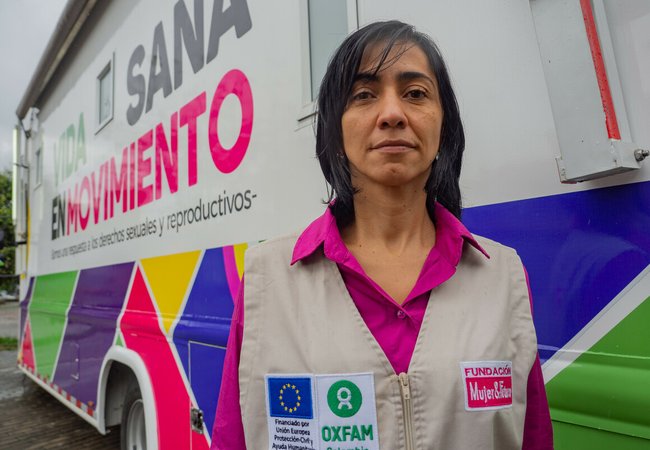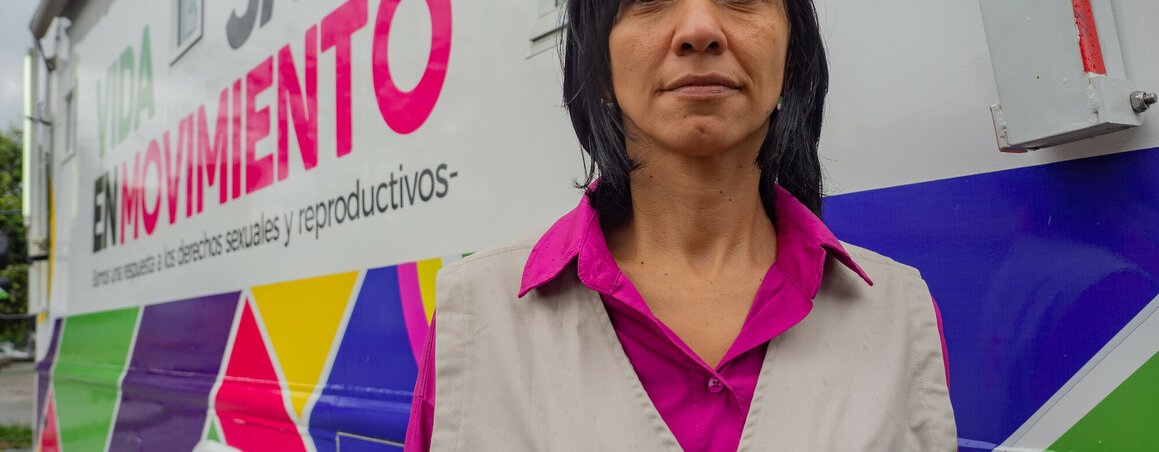Johanna Duran Gomez, director of Fundación Mujer y Futuro, at a mobile clinic focused on reproductive health services and women’s rights in Columbia. Photo: Elizabeth Stevens / Oxfam.


Keeping people safe
Keeping people safe is a vital part of our work worldwide and we are committed to continually learning in order to make Oxfam a safer place for all.
Safeguarding in our shops
How we are keeping people safe
Explore the sections below to see what we are doing differently
Creating a more survivor-centred approach
Ensuring survivors can report abuse in confidence – and that they get the support they need – is paramount. We want survivors, past and present, to continue to come forward and report allegations and we know this can be painful and traumatic. We’ve endeavoured to make the process more accessible and to be survivor-centred in our approach and will continue to seek improvements.
Specialist safeguarding staff are also working on the ground where they are most needed – for example, we have two safeguarding specialist humanitarian support personnel who, when travel is not restricted, are deployed into countries to provide additional safeguarding support. We also have at least one dedicated safeguarding focal point in place in every country where Oxfam works.
We have established clear procedures to ensure a more consistent, survivor-centred approach to respond to cases, demystifying the reporting process and building trust. These procedures also include doing all we can to protect the confidentiality and safety of survivors and whistle-blowers as well as providing medical, health, social, emotional and other forms of support for survivors.
We also worked with a Survivor Reference Group, who advised Oxfam International’s Independent Commission, to help us learn and improve what we do. Oxfam GB has since created a survivor centred policy and completed a study of reparations for survivors.
Developing safer programmes and working in partnership with communities
We have improved our understanding and management of the risks posed by our work, in order to ensure that all those affected by our humanitarian and development programmes can participate more safely. The approach, known as Safe Programming, includes training and toolkits for staff and partners as well as conducting research within communities so that we are more accountable.
Adapting to Covid-19
In response to Covid-19 restrictions, we created online safeguarding training tools to ensure that staff, volunteers, and partners were provided with effective support and training during this period.
Thinking globally and working with others
We helped establish a Global Safeguarding Shared Service with all Oxfam affiliates - networking safeguarding specialists from across the Oxfam confederation. We have introduced a new electronic record-keeping system for all cases. This secure central database is used by all Oxfam affiliates to build information and evidence of potential crimes. We’re also working together to ensure everyone follows the same procedures.
Our policies in reporting potential crimes to police and local authorities are clearer and have been developed with guidance from survivors.
We are working with the wider aid sector to stop perpetrators from moving on unchecked to other roles and organisations. Oxfam is leading work with other agencies to better share information about offenders. Here at Oxfam GB, we have implemented a new, central referencing system, so that only approved managers can provide job references for people leaving the organisation.
Safer recruitment, changing our culture and living our values
We know that tackling abuse and exploitation in our programmes is not enough. We must live our values throughout the organisation by examining our own attitudes and behaviours and by changing power structures to prevent the abuse of power which is often at the heart of sexual exploitation and abuse cases.
As part of our commitment to improve our culture and ensure that all staff understand and share our values, our recruitment processes and interviews now include mandatory questions on values, safeguarding and feminist principles. We have also introduced initiatives to increase awareness and understanding amongst staff of how to challenge negative behaviours and misconduct, including concerns of bullying and harassment.
Safeguarding training is mandatory for Oxfam GB's 10,000 staff around the world, and all staff and volunteers sign a code of conduct when starting work with us.
In all our shops across the UK, enhanced DBS checks are put in place for all shop managers, deputy managers and volunteers who supervise young people. Right now all volunteers complete a disclosure form as a minimum, which asks them questions such as whether they have any spent convictions, are on a barred list, or have been cautioned for violent or sexual offences.
Being more open and having greater oversight of risk and progress on safeguarding
The Oxfam confederation has a Global Director of Safeguarding. Oxfam GB’s trustees have oversight of safeguarding across the organisation, through the work of the Safeguarding & Ethics Committee, led by Annie Hudson and of which our Chair of Trustees, Charles Gurassa, is a member.
We are committed to transparency and will continue to report regularly on our progress. A breakdown of completed Oxfam GB safeguarding cases is provided in our annual report. Every six months, we publish a report on all safeguarding cases we have completed across the Oxfam confederation. The Oxfam GB Council of Trustees considers reports on safeguarding issues at every meeting, with a more detailed review of trends every six months. We also have clear policies on reporting serious incidents to donors.
We're committed to sharing information openly, ensuring public reputation is never put before the safety of people we are responsible for.
The Charity Commission
“There is no ultimate end point for safeguarding whereby an organisation can say the work is complete, rather an acknowledgement there is always a need to learn, adapt and develop…”
Report on Oxfam’s GB’s progress on safeguarding, as part of Charity Commission inquiry.